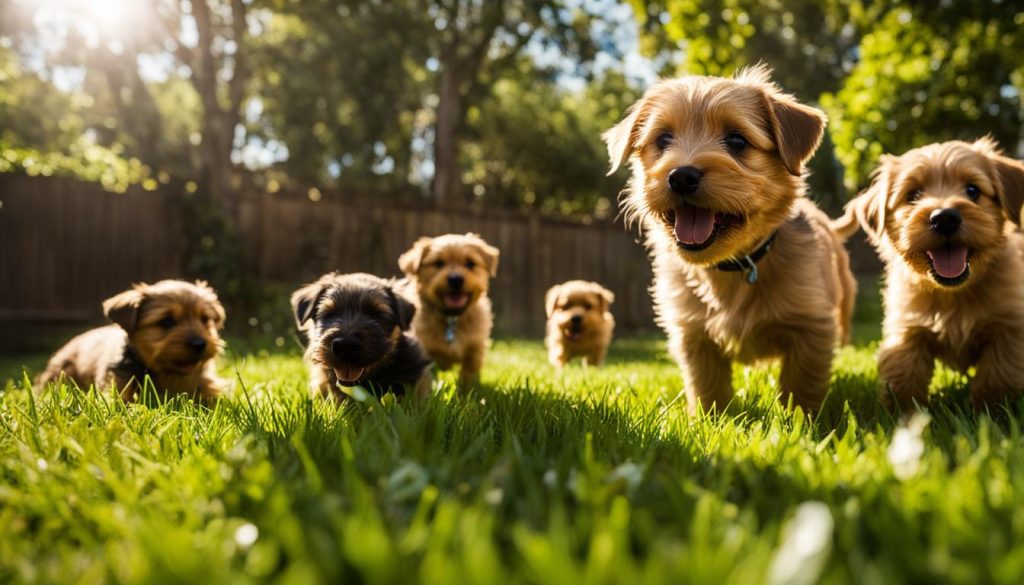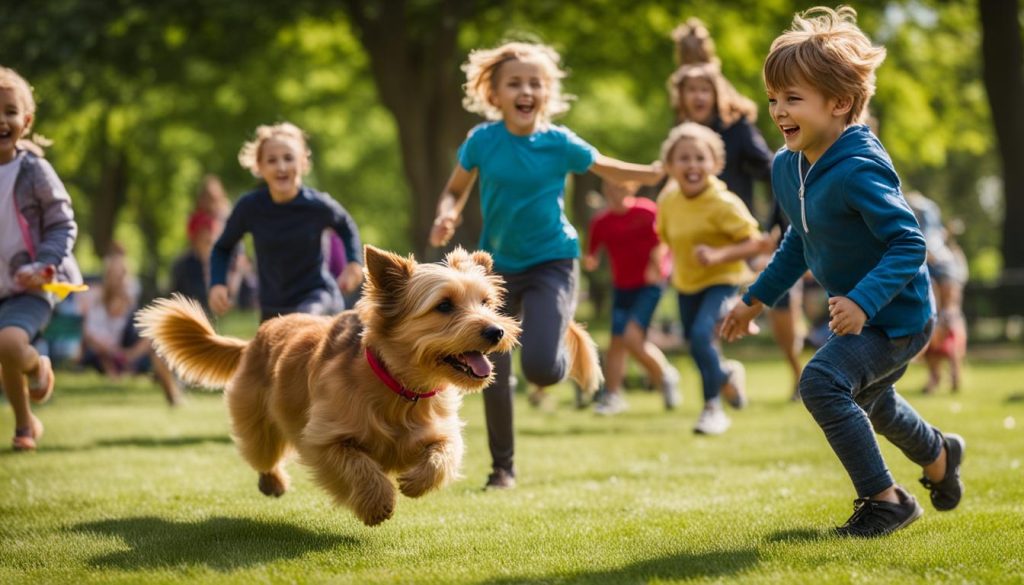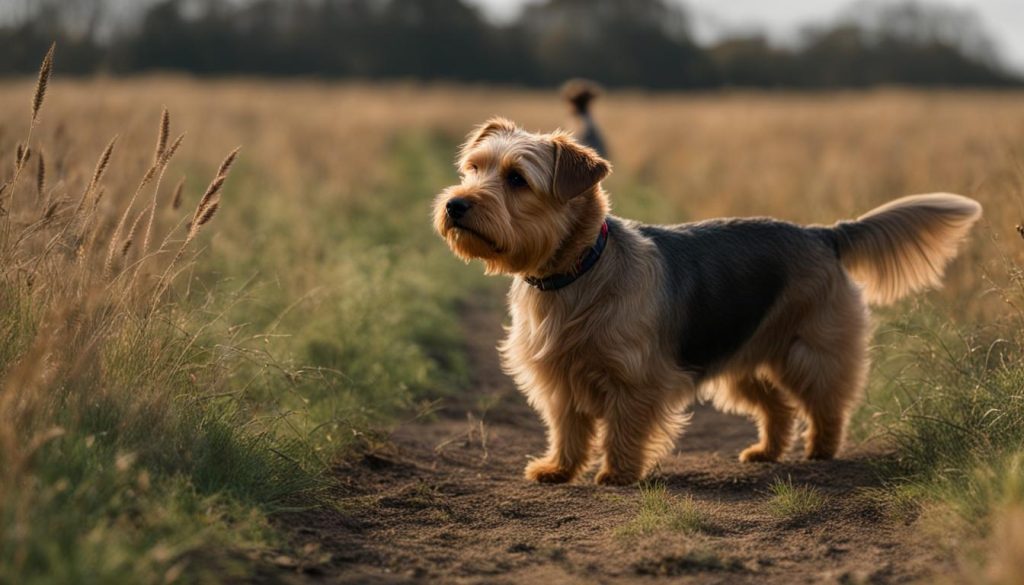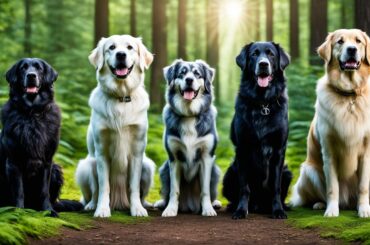Welcome to my comprehensive guide on Norfolk Terrier dog breeds. In this article, I will provide you with valuable information about the Norfolk Terrier, their unique characteristics, training techniques, health concerns, availability of puppies, grooming requirements, temperament, care, and their historical background as a working dog. Whether you are considering bringing a Norfolk Terrier into your family or simply interested in learning more about this fascinating breed, this guide has got you covered!
Key Takeaways:
- The Norfolk Terrier is a distinct breed known for its affectionate nature and lively temperament.
- They are small but strong dogs with wedge-shaped muzzles and a compact body.
- Norfolk Terriers respond well to positive reinforcement training methods.
- Regular veterinary check-ups and proper nutrition are essential for their overall health.
- They make excellent family pets but may not be suitable for households with small pets.
Norfolk Terrier Characteristics: Size, Temperament, and Care

The Norfolk Terrier is a small but sturdy dog with distinct characteristics that set it apart from other terrier breeds. This breed displays a combination of size, temperament, and care requirements that make it a unique and loving addition to any family.
Size
The Norfolk Terrier is a small dog, typically weighing between 11-12 pounds (5-5.4 kg) and standing around 9-10 inches (23-25 cm) tall at the shoulder. Despite their small stature, Norfolk Terriers have a compact and muscular build, giving them the strength and agility to keep up with an active lifestyle.
Temperament
Norfolk Terriers are known for their lively and alert temperament. They are energetic, playful, and always ready for adventure. Despite their liveliness, Norfolk Terriers are also loyal and affectionate towards their families. They form strong bonds with their owners and thrive on companionship. However, it is important to note that Norfolk Terriers have a strong prey drive and may not be suitable for households with small pets.
Care
Proper care and maintenance are essential to keep Norfolk Terriers healthy and happy. Their wiry coat requires regular grooming to prevent matting and keep it in good condition. This breed should be brushed at least once a week and hand-stripped twice a year to remove dead hair. Bathing should be done as needed, using dog-specific shampoos.
In addition to grooming, Norfolk Terriers require proper socialization and obedience training. They are intelligent dogs that respond well to positive reinforcement methods. Early training and socialization set the foundation for a well-behaved and well-adjusted Norfolk Terrier. Regular exercise, such as daily walks or playtime, is important to keep them physically and mentally stimulated. A balanced diet tailored to their size, age, and activity level is also crucial for their overall well-being.
Table: Norfolk Terrier Characteristics
| Characteristic | Description |
|---|---|
| Size | Small, weighing around 11-12 pounds (5-5.4 kg) and standing around 9-10 inches (23-25 cm) tall at the shoulder. |
| Temperament | Lively, alert, energetic, playful, loyal, and affectionate. May not be suitable for households with small pets. |
| Care | Regular grooming, socialization, obedience training, daily exercise, and a balanced diet tailored to their needs. |
Norfolk Terrier Training: Techniques and Tips
Training a Norfolk Terrier is an important aspect of owning this intelligent and lively breed. With their eager-to-please nature, positive reinforcement methods work best to ensure a successful training experience. It is crucial to establish a strong bond with your Norfolk Terrier, focusing on clear communication and setting boundaries.
One key aspect of training a Norfolk Terrier is leash training. Due to their strong prey drive, it is essential to teach them to walk calmly on a leash and not chase after small animals. Using a harness can be beneficial in providing better control during walks. Furthermore, consistent and patient training will help curb any unwanted behaviors and foster good leash manners.
Harsh training tactics should be avoided when working with a Norfolk Terrier, as they can lead to fear or aggression. Positive reinforcement techniques such as rewards, treats, and praise are highly effective in motivating and encouraging desired behaviors. Consistency, patience, and repetition are key in helping your Norfolk Terrier understand and follow commands.
“Training a Norfolk Terrier requires a gentle approach, as they respond best to positive reinforcement. Their affectionate nature and eagerness to please make training sessions enjoyable and rewarding for both owner and dog.”
Socialization and Obedience Training
Socialization is crucial for a Norfolk Terrier to develop good manners and appropriate behavior around other animals and unfamiliar people. Introduce your Norfolk Terrier to different environments, experiences, and stimuli from a young age. This will help them become well-rounded and confident in various situations.
Obedience training is another important aspect of Norfolk Terrier training. Teaching basic commands such as sit, stay, come, and leave it will help establish a well-behaved dog. Enrolling in a basic obedience class with a professional trainer can provide structured training sessions and guidance.
Training Tips:
- Start early: Begin training your Norfolk Terrier as soon as you bring them home to establish good habits and behaviors.
- Be patient and consistent: Norfolk Terriers are intelligent but can be independent. Stay calm and consistent in your training approach.
- Use positive reinforcement: Reward your Norfolk Terrier with treats, praise, and affection when they exhibit desired behaviors.
- Keep training sessions short and fun: Norfolk Terriers have a relatively short attention span, so keep training sessions engaging and enjoyable.
- Seek professional help if needed: If you encounter challenges or difficulties in training your Norfolk Terrier, consult with a professional dog trainer who specializes in positive reinforcement methods.
| Training Tip | Description |
|---|---|
| Start early | Begin training your Norfolk Terrier as soon as you bring them home to establish good habits and behaviors. |
| Be patient and consistent | Norfolk Terriers are intelligent but can be independent. Stay calm and consistent in your training approach. |
| Use positive reinforcement | Reward your Norfolk Terrier with treats, praise, and affection when they exhibit desired behaviors. |
| Keep training sessions short and fun | Norfolk Terriers have a relatively short attention span, so keep training sessions engaging and enjoyable. |
| Seek professional help if needed | If you encounter challenges or difficulties in training your Norfolk Terrier, consult with a professional dog trainer who specializes in positive reinforcement methods. |
Norfolk Terrier Health: Common Concerns and Preventive Care
Ensuring the health and well-being of your Norfolk Terrier is crucial for their overall quality of life. While these dogs are generally healthy, there are some common health concerns that owners should be aware of. By understanding these potential issues and implementing preventive care measures, you can help your Norfolk Terrier live a long and happy life.
Allergies
One of the common health concerns in Norfolk Terriers is allergies. They can be allergic to various environmental factors such as pollen, dust mites, or certain foods. Common symptoms of allergies in dogs include itching, excessive licking, sneezing, and inflamed skin. If you suspect your Norfolk Terrier has allergies, it is important to consult with a veterinarian for proper diagnosis and treatment options.
Hip Dysplasia and Patellar Luxation
Norfolk Terriers are also prone to hip dysplasia and patellar luxation, which are both orthopedic conditions. Hip dysplasia occurs when the hip joint doesn’t develop properly, leading to discomfort and mobility issues. Patellar luxation, on the other hand, is the dislocation of the kneecap, causing lameness and difficulty walking. Regular veterinary check-ups and appropriate exercise can help detect and manage these conditions early on.
Dental Issues
Another common concern for Norfolk Terriers is dental problems. These dogs are prone to dental issues like periodontal disease, tooth decay, and tartar build-up. Regular dental care, including brushing your dog’s teeth and providing appropriate chew toys, can help maintain their oral health. Additionally, scheduling regular professional dental cleanings with your veterinarian is recommended.
| Health Concerns | Description | Preventive Measures |
|---|---|---|
| Allergies | Allergies to environmental factors or certain foods | Consult with a veterinarian and manage triggers |
| Hip Dysplasia | Improper development of the hip joint | Regular check-ups, appropriate exercise |
| Patellar Luxation | Dislocation of the kneecap | Regular check-ups, appropriate exercise |
| Dental Issues | Periodontal disease, tooth decay, tartar build-up | Regular dental care, professional cleanings |
Norfolk Terrier Puppies: Availability and Considerations

If you’re considering adding a Norfolk Terrier puppy to your family, it’s important to understand the availability and considerations involved in finding the perfect furry companion. Norfolk Terrier puppies are known for their rarity, with only around 300 born each year. Due to their limited numbers, it’s crucial to find a reputable breeder who prioritizes the health and well-being of their puppies.
When searching for Norfolk Terrier puppies for sale, take the time to research and visit multiple breeders. Look for breeders who are knowledgeable about the breed, actively involved in dog shows or competitions, and can provide references from previous puppy buyers. An ethical breeder will also be open to answering any questions you may have and will allow you to see the puppies in their environment before making a decision.
It’s important to consider the responsibilities and commitment involved in raising a Norfolk Terrier puppy. These puppies require proper socialization, training, and a suitable environment to thrive. Norfolk Terriers are known for their lively temperament, so providing adequate exercise and mental stimulation is vital. Additionally, budgeting for veterinary care, grooming, and nutritional needs is essential to ensure your puppy grows into a healthy adult.
By taking the time to find a reputable breeder and understanding the commitment required, you can welcome a Norfolk Terrier puppy into your home with confidence. These adorable and lively companions will bring joy and love to your family for years to come.
Table: Key Considerations for Norfolk Terrier Puppies
| Consideration | Details |
|---|---|
| Availability | Rare breed, with only around 300 Norfolk Terrier puppies born each year |
| Reputable Breeder | Research and visit multiple breeders, look for knowledge, references, and ethical practices |
| Responsibilities | Proper socialization, training, exercise, and mental stimulation |
| Budget | Account for veterinary care, grooming, and nutritional needs |
Norfolk Terrier Grooming: Coat Care and Maintenance

Grooming plays a crucial role in maintaining the health and appearance of Norfolk Terriers. Their wiry double coat requires regular care to prevent matting and preserve its texture. This breed should be brushed at least once a week to remove loose hair and prevent tangles. Hand-stripping, a technique to pluck out dead hairs, should be done twice a year to promote healthy coat growth.
In addition to brushing and hand-stripping, other grooming tasks include nail trimming, ear cleaning, and dental hygiene. Keeping the nails short is important to ensure comfort and prevent them from becoming overgrown. Regular ear cleaning with a veterinarian-approved solution helps prevent infections. Similarly, maintaining good dental hygiene by brushing the teeth regularly or using dental chews can help prevent dental diseases.
Grooming Tips for Norfolk Terriers:
- Use a slicker brush or a comb with wide teeth to brush their coat. This helps remove loose hair and prevents matting.
- Avoid shaving or cutting the coat short as it provides protection from the sun, temperature, and skin irritants.
- When hand-stripping, work in small sections and pluck out dead hairs gently. It’s important not to pull the live hairs to avoid discomfort.
- Trim the nails regularly, ensuring you do not cut into the quick. If unsure, seek guidance from a professional groomer or a veterinarian.
- Use a dog-specific ear cleaner and cotton balls to clean the ears. Avoid inserting any objects deep into the ear canal to prevent injury.
- Brush the teeth with a dog-specific toothbrush and toothpaste to maintain good oral health.
Although grooming Norfolk Terriers can be time-consuming, proper coat care and regular maintenance help them look and feel their best. It is important to establish a grooming routine from a young age to acclimate them to the process and make it a positive experience.
| Grooming Task | Frequency |
|---|---|
| Brushing | At least once a week |
| Hand-stripping | Twice a year |
| Nail trimming | Every 4-6 weeks |
| Ear cleaning | As needed, usually monthly |
| Dental hygiene | Daily brushing or dental chews |
Norfolk Terrier Temperament: Family-Friendly and Sociable

The Norfolk Terrier is known for its friendly and sociable temperament, making it a great addition to any family. These dogs get along well with children and can adapt easily to family life. Early socialization is important to ensure that Norfolk Terriers are comfortable around other animals and unfamiliar people.
With their affectionate nature and lively temperament, Norfolk Terriers form strong bonds with their owners. They are often described as affectionate, lively, and determined. These dogs thrive on companionship and enjoy being part of the family.
It is important to note, however, that Norfolk Terriers have a strong prey drive and may not be suitable for households with small pets. While they have a playful side, their instinct to chase after small animals can potentially cause harm. Therefore, it is crucial to provide proper training and supervision when introducing a Norfolk Terrier to a household with other pets.
| Traits | Description |
|---|---|
| Affectionate | Norfolk Terriers are known for their loving and caring nature towards their family. |
| Lively | These dogs have a high energy level and enjoy activities that stimulate their mind and body. |
| Determined | Norfolk Terriers are intelligent and determined dogs, which can make training them a rewarding experience. |
In summary, Norfolk Terriers have a family-friendly and sociable temperament. They are affectionate, lively, and determined dogs that form strong bonds with their owners. However, their prey drive may make them unsuitable for households with small pets. With proper training and socialization, Norfolk Terriers can bring joy and companionship to families who are looking for an energetic and loving dog.
Norfolk Terrier Care: Feeding and Nutrition
Proper feeding and nutrition are essential for the health and well-being of Norfolk Terriers. These small and energetic dogs have specific dietary needs that should be met to ensure their overall vitality. Here are some important considerations when it comes to Norfolk Terrier care:
Dietary Requirements:
Norfolk Terriers should be fed a high-quality dog food that is suitable for their age, size, and activity level. Look for a balanced diet that provides the necessary nutrients, including protein, carbohydrates, fats, vitamins, and minerals. Avoid feeding your Norfolk Terrier table scraps or excessive treats, as these can lead to weight gain and health issues.
Portion Control:
Portion control is crucial for Norfolk Terriers, as they can be prone to obesity if overfed. Consult with your veterinarian to determine the appropriate portion sizes for your dog based on their age, weight, and activity level. Dividing their daily food into two or three meals can help prevent overeating and promote healthy digestion.
Hydration:
Ensure that your Norfolk Terrier has access to fresh and clean water at all times. Hydration is essential for their overall health and can prevent urinary tract problems. Monitor your dog’s water intake and refill their water bowl regularly.
| Food to Avoid: | Food to Include: |
|---|---|
|
|
“Proper feeding and nutrition are essential for the health and well-being of Norfolk Terriers.”
It is important to consult with your veterinarian for personalized recommendations regarding your Norfolk Terrier’s specific dietary needs. They can provide guidance on selecting the right food, monitoring portion sizes, and addressing any unique health considerations your dog may have.
Remember, Norfolk Terrier care extends beyond feeding and nutrition. Regular exercise, mental stimulation, grooming, and veterinary check-ups are equally important aspects of maintaining your Norfolk Terrier’s overall health and happiness.
Norfolk Terrier as a Working Dog: Heritage and Skills

The Norfolk Terrier has a rich heritage as a working dog, hailing from East Anglia, England. Bred to be skilled vermin catchers, these small earth dogs possess the necessary instinct and drive to excel in their role. They were highly regarded for their ability to control small animal populations on farms, stables, and barns in rural areas.
Known for their determination and tenacity, Norfolk Terriers are versatile working dogs. Their compact size allows them to navigate tight spaces with ease, making them effective in locating and capturing rodents. Their wiry coat provides protection from the elements while boasting a rugged appearance that adds to their working dog image.
Despite being primarily companion dogs today, Norfolk Terriers still retain their working instincts. Their energy level and intelligence make them enthusiastic participants in various dog sports and activities. They excel in agility trials, tracking exercises, and obedience competitions. These activities not only provide mental stimulation but also allow Norfolk Terriers to showcase their natural skills and abilities.
| Working Skills | Description |
|---|---|
| Vermin Control | Norfolk Terriers are exceptional at hunting and catching small rodents, making them valuable in controlling infestations in agricultural settings. |
| Alertness | These dogs possess a keen sense of awareness and are quick to alert their owners to any potential threats or unusual activities. |
| Adaptability | Due to their size and versatile nature, Norfolk Terriers can adapt to various working environments, including farms, stables, and even urban areas. |
While their working abilities are no longer their primary function, Norfolk Terriers still thrive when engaged in activities that tap into their innate instincts. These activities not only provide physical exercise but also contribute to their overall well-being and happiness as they continue to honor their working dog heritage.
Norfolk Terrier as a Family Pet: Bonding and Companionship

The Norfolk Terrier is an excellent choice for families seeking a loyal and affectionate companion. Their friendly and sociable nature makes them well-suited for family life, forming strong bonds with their owners. These small dogs thrive on companionship and enjoy being part of the family’s daily activities. Whether it’s playing in the backyard, going for walks, or just relaxing on the couch, a Norfolk Terrier will be right by your side, bringing joy and warmth to your home.
When bringing a Norfolk Terrier into your family, it is essential to provide them with proper socialization and training from an early age. This will ensure that they are comfortable around other animals and unfamiliar people, making them well-rounded and adaptable pets. Norfolk Terriers are known for their lively and determined nature, so consistent training and mental stimulation are crucial in preventing behavioral issues. With patience, positive reinforcement, and clear boundaries, a Norfolk Terrier will thrive as a well-behaved family pet.
It is important to note that Norfolk Terriers may not be suitable for households with very young children or small pets. Their strong prey drive may lead to accidental harm or potential conflicts. However, with proper guidance and supervision, a Norfolk Terrier can coexist harmoniously within a family. They are known for their loyalty and watchful nature, making them excellent watchdogs, always alert to the activities and well-being of their loved ones.
Advantages of Norfolk Terriers as Family Pets:
- Strong bond and companionship
- Friendly and sociable nature
- Well-suited for family life
- Playful and lively
- Loyal and watchful
“A Norfolk Terrier will become an integral part of your family, bringing love, joy, and endless laughter to your home.” – Norfolk Terrier Enthusiast
In summary, the Norfolk Terrier’s affectionate nature, coupled with their watchful and loyal temperament, makes them an excellent choice for families seeking a loving and engaging pet. With proper socialization, training, and mental stimulation, a Norfolk Terrier will form a strong bond with their owners and bring companionship to every aspect of family life. While they may not be suitable for households with very young children or small pets, their playful demeanor and watchful nature make them an ideal addition to many families across the United States.
Wrapping Up
To summarize, the Norfolk Terrier is a delightful and spirited breed that brings joy and companionship to any dog enthusiast in the United States. With their affectionate nature, loyalty, and intelligence, they make excellent family pets and form strong bonds with their owners.
However, it is important to note that Norfolk Terriers require careful socialization, training, and maintenance to thrive in a home environment. Their small size, energetic nature, and prey drive should be considered before adding them to a household with small pets or very young children.
Despite their small stature, Norfolk Terriers have a rich working dog heritage and excel in various dog sports and activities. They are versatile and enthusiastic participants, showcasing their skills and instincts passed down through generations of vermin-catching and fox-chasing.
In summary, the Norfolk Terrier is a lively and engaging companion that requires attention and care to thrive. With proper socialization, training, and physical and mental stimulation, they can bring years of love, laughter, and fulfillment to their owners.
FAQ
What is the Norfolk Terrier’s origin?
The Norfolk Terrier originated in East Anglia, England.
What are the typical characteristics of a Norfolk Terrier?
Norfolk Terriers are small but strong dogs with wedge-shaped muzzles, drop-ears, and a scruffy wiry coat. They have a lively temperament and are known for being affectionate.
Are Norfolk Terriers good with children?
Yes, Norfolk Terriers generally get along well with children and can adapt well to family life.
Do Norfolk Terriers need regular grooming?
Yes, Norfolk Terriers have a wiry double coat that requires regular grooming to prevent matting and maintain its texture.
Are Norfolk Terriers prone to any health issues?
Yes, Norfolk Terriers are prone to allergies, hip dysplasia, patellar luxation, and dental issues.
Are Norfolk Terriers easy to train?
Yes, Norfolk Terriers are intelligent dogs that respond well to positive reinforcement training methods.
Do Norfolk Terriers have a strong prey drive?
Yes, Norfolk Terriers have a strong prey drive and may chase small animals if not properly controlled.
How often should Norfolk Terriers be fed?
Norfolk Terriers should be fed high-quality dog food appropriate for their age, size, and activity level. Portion control is important to prevent obesity.
Where can I find a Norfolk Terrier puppy?
Norfolk Terrier puppies are rare, with only around 300 born each year. It is important to find a reputable breeder.
Can Norfolk Terriers be used for dog sports and activities?
Yes, Norfolk Terriers have working instincts and energy that make them capable and enthusiastic participants in various dog sports and activities.
Are Norfolk Terriers suitable for households with small pets?
Norfolk Terriers have a strong prey drive and may not be suitable for households with small pets.






